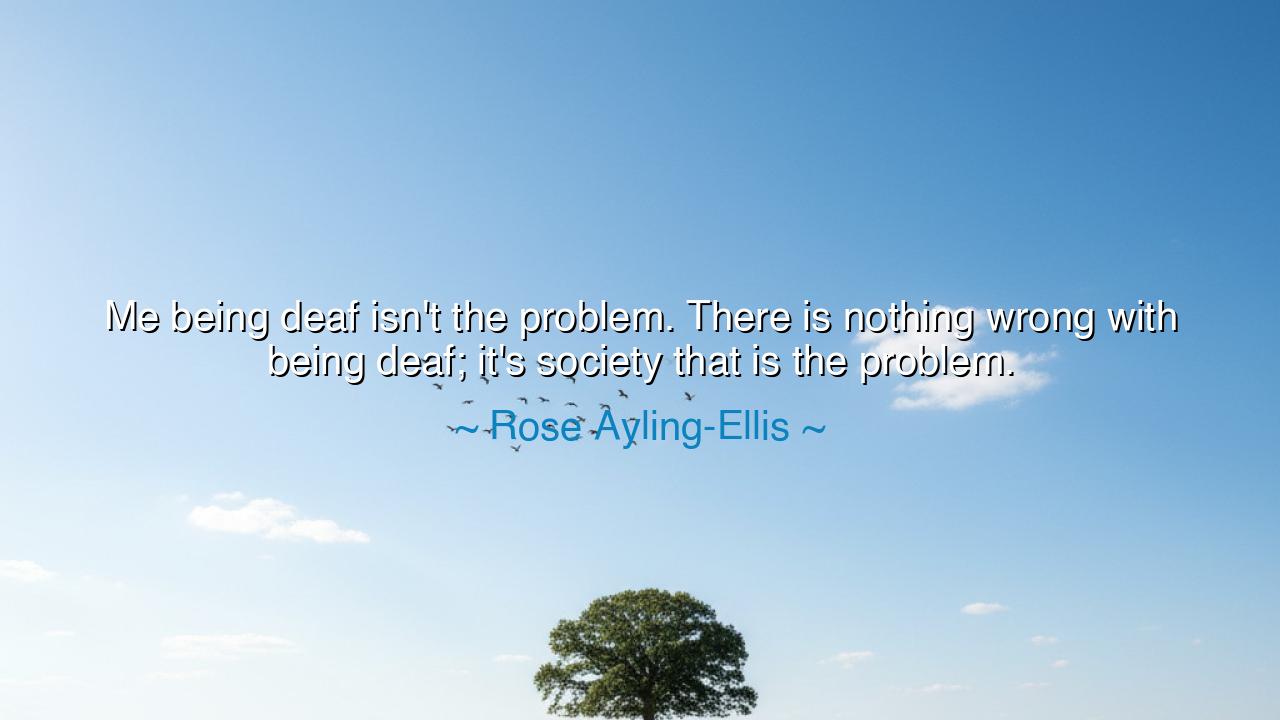
Me being deaf isn't the problem. There is nothing wrong with
Me being deaf isn't the problem. There is nothing wrong with being deaf; it's society that is the problem.






"Me being deaf isn't the problem. There is nothing wrong with being deaf; it's society that is the problem." These powerful words by Rose Ayling-Ellis speak to a profound truth that resonates deeply across the ages: disability is not inherently a problem, but rather, the real challenge lies in how society perceives and reacts to those who are different. Ayling-Ellis, a deaf actress and advocate, shifts the focus from the individual who lives with a disability to the larger society that creates barriers, assumptions, and judgments that hinder full inclusion. This quote challenges the norms and structures that shape our world, urging us to recognize that the true obstacle is not in the person, but in the systems and mindsets that define what is “normal.”
In the ancient world, the theme of society’s treatment of those considered "different" can be found in the stories of the disabled and the outcasts. The Greeks, despite their intellectual and cultural achievements, often viewed those with disabilities as being outside the norm of society. In some cases, they were seen as divinely cursed or as lacking the strength required to fulfill their societal roles. However, philosophers like Plato and Aristotle did begin to question these assumptions, acknowledging that individuals with disabilities might still contribute to society in their own way, though it was a slow process. In a world that held beauty, strength, and intellect as virtues, those who could not conform to these ideals were often marginalized, forced to face a society that treated them as lesser.
Ayling-Ellis’ perspective, however, echoes a wisdom that has long been recognized in the history of humankind: difference should not be equated with deficiency. Throughout the centuries, many societies have struggled with this concept, as those who were considered “other” were often met with either disdain or pity. But there are also examples of societies that honored individual differences. For example, ancient Egypt had a more inclusive view of disability. Blind and deaf individuals, while not afforded the same societal roles as the able-bodied, were not ostracized to the extent they were in other parts of the ancient world. Egyptian society embraced individuals for their unique skills and contributions, even if their abilities were different from the mainstream.
In modern times, Rose Ayling-Ellis’s words bring us to the harsh realities that continue to exist. The perception that being deaf is inherently a problem reflects how many societies continue to see individuals with disabilities through a lens of deficiency. When Ayling-Ellis asserts that her deafness is not the problem, she calls attention to the structural barriers and discriminatory mindsets that limit access to opportunities and full participation in society. This is the same argument that the disability rights movement has championed for decades: it is not the disability itself, but the society that fails to accommodate and respect the diversity of human experiences and needs. The true challenge lies not in the individual, but in the systems that define norms and exclude those who do not fit them.
Consider the historical example of Helen Keller, one of the most iconic figures in the disability rights movement. Keller, who was both blind and deaf, overcame monumental obstacles in a world that saw her as incapable. Yet, rather than allowing society’s expectations to limit her, Keller rose above them, becoming an outspoken advocate for disability rights and proving to the world that those with disabilities could be more than what society imagined. Her strength, intellect, and contribution to society defied the conventional norms, challenging society to reconsider its views on disability and potential. Keller’s legacy is a testament to the power of seeing the individual rather than focusing on their limitations.
Ayling-Ellis’ call to recognize the problem as society itself is a powerful reminder that change begins with how we view and treat those who are different. Society, in its relentless pursuit of uniformity, often excludes and marginalizes individuals who do not fit into the preconceived mold. But the lesson from Ayling-Ellis, Keller, and countless others who have fought for equality is that individuals with disabilities are not broken or lesser, they simply need a society that is more open, inclusive, and willing to accommodate a broad spectrum of human experiences. Society, therefore, must change its thinking. Inclusion does not mean simply allowing individuals to be a part of the system—it means reimagining the system itself to allow for diversity and equity at every level.
In our own lives, we must challenge the prejudices and stereotypes that define how we see others. We must ask ourselves: How can we create inclusive spaces, not just for those who are deaf or disabled, but for anyone who has been marginalized by society? True progress lies in creating a world where people are not expected to conform to a narrow set of norms, but are instead allowed to express and contribute their unique abilities. Let us, as individuals, be agents of change, advocating for a world that honors differences rather than hiding them, that sees the value in every person, regardless of their circumstances. For when we begin to see the world through the eyes of inclusivity, we embrace the potential of humanity as a whole.






AAdministratorAdministrator
Welcome, honored guests. Please leave a comment, we will respond soon